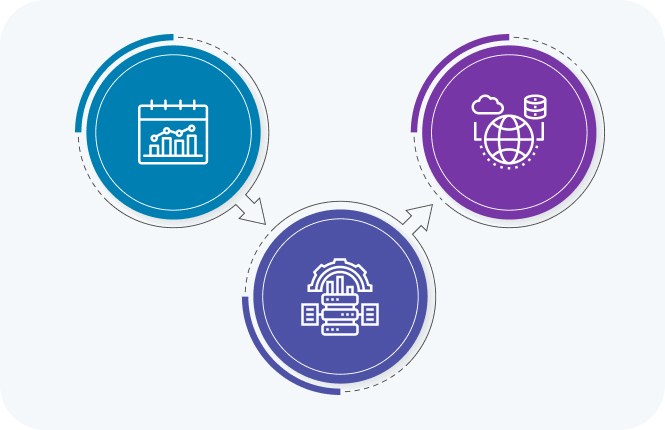Enterprise Data Management Services
Smart solution to give true meaning to your business data.
Show Me How







Track these with measurable KPIs to show value.
Talk to An Expert Now
Offerings include ingestion, quality, master data, storage, governance, and integration. Each offering reduces risk and raises trust in analytics.

ETL extracts records from source systems, applies transform rules, and loads cleaned data into a central store. This supports a single source of truth.
A reliable ETL design uses change data capture, schema checks, and repeatable templates so the enterprise data management services adapts as sources change.
Data quality management enforces validation, cleansing, enrichment, and integrity checks. Quality gates stop bad data from reaching reports.
Measure quality with accuracy rate, completeness, and exception counts to show the impact of enterprise data management services.
Master data management sets authoritative records and deduplication rules. It defines stewards and a single-write pattern for masters.
Treat master data as a core asset. The master store feeds consistent values to reporting and operations in the enterprise data management solution.
A data warehouse stores cleaned, modeled data for analytics. It supports semantic layers used by BI tools and enforces query SLAs.
Pair the warehouse with governance and the enterprise data management services system so downstream reports use trusted data.
Data governance defines policies, roles, and review processes. It provides lineage, approvals, and audit logs to prove control.
Governance is a required feature of any enterprise data management system that must support compliance and stewardship.
Integration connects ERP, CRM, SaaS, and custom apps so data flows into the master store. It reduces rework and ensures systems share the same facts.
The enterprise data management solution binds integrations into repeatable patterns for faster onboarding of new sources.
Choose an enterprise data management company that pairs deep governance with engineering patterns. Look for pilot proof, clear KPIs, and platform coverage.
Compare enterprise data management companies on pilot speed, governance completeness, and repeatable engineering. These factors predict delivery and cost.



Evaluation Our enterprise data management consulting includes research priorities, map sources, and set short and long goals.
Data Processing Frame processes and quality gates to protect and process data for target measures
Strategy Assess infrastructure and align data and business strategy with technology choices.
Implementation Create a roadmap and deploy the enterprise data management solution in phases to reduce risk.
When leaders ask what is enterprise data management, they usually mean a single framework to collect, clean, and govern all business data. Strong enterprise data management services turn scattered information into one trusted view, making reporting easier and decisions faster across teams and systems.
Modern firms rely on enterprise data management services to reduce manual effort, cut data errors, and improve trust in reports. With a solid enterprise data management system in place, you gain consistent data for finance, risk, and operations, which directly supports better margins and lower compliance risk.
A robust enterprise data management solution pulls data from many sources, validates it, and builds a golden copy for downstream use. Good enterprise data management consulting then maps this flow to your real processes, so teams see the right data, in the right format, at the moment they need it.
A mature enterprise data management system usually includes ingestion pipelines, data quality engines, metadata catalogs, and secure APIs. Leading enterprise data management companies also add lineage tracking and version control, so you can trace every figure in a report back to its original source with full transparency.
Enterprise data management consulting helps define roles, access rules, and approval paths that the platform then enforces. In a well-architected enterprise data management solution, policies drive permissions, encryption, and logging, so every query, change, and feed is tracked, audited, and aligned with regulatory obligations.
The benefits of enterprise data management include faster queries through smart indexing, caching, and partitioning strategies. When enterprise data management services tune storage layouts and processing jobs, even heavy analytics workloads run smoothly, giving users live-like insights instead of waiting hours for overnight batch reports.
Enterprise data management companies design connectors that talk to core banking, ERPs, CRMs, and cloud warehouses without disrupting them. With targeted enterprise data management consulting, you can phase in new pipelines, keep legacy stable, and still unlock benefits of enterprise data management for AI, BI, and real-time reporting.
Looking for Digital Transformation?
INDIANA:
201 N Illinois Street,
16th Floor - South Tower
Indianapolis, IN 46204
United States
ILLINOIS:
405 W
Superior St, 707
Chicago, Illinois 60654
United States
Email us for Business
Call Us
AUSTRALIA:
Unit 605,
354 Church Street
Parramatta, Sydney, NSW 2150
Australia
Email us for Business:
Call Us
Indore Office:
NRK Business Park,
901 A, PU4, Scheme No. 54, Vijay Nagar,
Indore,
Madhya Pradesh 452010,
India
Pune Office:
Nyati Empress,
Awfis, 9th Floor, Off Viman Nagar Road,
Viman Nagar,
Pune, Maharashtra 411014,
India
Hyderabad Office:
N Heights,
Level 6, Plot No. 38, Phase 2, HITEC City,
Hyderabad, Telangana
500081,
India
Email us for Career:
Email us for Business:
Call Us